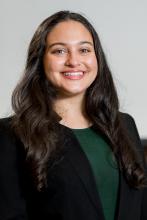Summer Bridge Spotlight: Priyanka Zylstra

Meet Priyanka Zylstra, one of five participants selected for the 2023 Summer Bridge program. A PhD student in the Department of History, Priyanka worked with the Education Justice Project (EJP).
How have you applied your humanistic training to advance the mission of the community organization?
In my research, I examine how marginalized communities have navigated and resisted structures of power, often through community work and coalition building. In my work with EJP, I bring these same questions to the present and to my local community, such as asking how the Reentry Guide Initiative supports those leaving prisons in Illinois. As a historian, I grapple with these sorts of large scale complex systems while combing through archival materials for the voices of everyday people.
Working with EJP, I am supporting the evaluation process for the reentry guidebook Mapping Your Future through crafting, distributing, and analyzing a survey to collect feedback from formerly incarcerated people, their friends and family, and service providers. Through this feedback, EJP can continue to improve the guide and help people navigate reentry. This project utilizes those same archival research skills and analytical approaches that I have exercised in my historical research. Through HWW, I use those skills to identify potential changes to the EJP reentry guide based on the voices of those who most use the guide. My humanistic training translates into this evaluation project to support EJP’s commitment to incarcerated people, their families, and their communities to which they return.
How has this experience contributed to your career development? What skills have you gained or developed?
Through HWW and EJP, I have learned about community-oriented work, collaboration, and evaluation processes. Through my project, I have witnessed the careful construction, discussion, and reflection of various evaluation tools. These processes demonstrated an ongoing centering of mission throughout the work, illustrating attentive ways to create effective and community-centered evaluation tools. I learned more concretely how to build an evaluation survey, present evaluation data, and begin conducting focus groups. These skills for program evaluation will transfer well into future projects, from course design to developing student programs at the University.
I also attended several coalition meetings as part of the EJP team, which modeled for me effective practices to sustain long-term collaboration with other groups across the state. As a historian, I can easily fall into a practice of reading and researching in isolation; however, the Bridge experience has illustrated the importance of and different approaches to collaborative work and initiatives.
What have you learned from working with this community organization?
I have learned so much more about incarceration in Illinois from the voices of incarcerated people, formerly incarcerated people, and their friends and family. Through discussions with the Reentry Guide Initiative team and reading the various materials produced by EJP, I better grasp the challenges incarcerated people may face and how a new set of challenges emerge upon reentry.
I especially value how EJP works out of community-defined needs and priorities. For instance, the Reentry Guide Initiative is developing toolkits that can support people during their release. This toolkit will be composed by people who have themselves experienced reentry, recognizing the importance of their first-hand knowledge. In improving other reentry materials, EJP always prioritizes the voices of formerly incarcerated people in developing content and approaches. This organization is truly mission-centered.
Is there anything else you’d like to share about your Summer Bridge program experience?
HWW has provided such wonderful support throughout this program, with regular cohort meetings to discuss our different experiences and reflect on our career goals. I appreciate the time, space, and connections HWW Summer Bridge Program has offered as I continue to explore this critical relationship between humanistic training and community-oriented work.